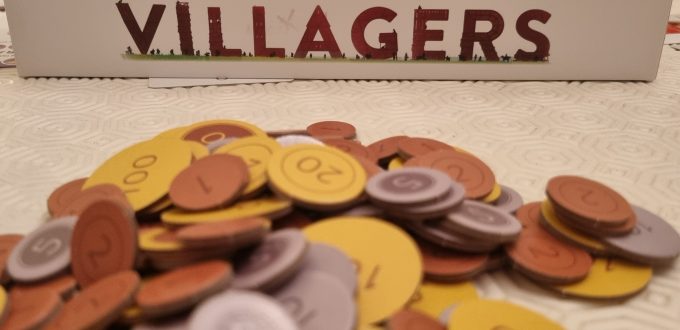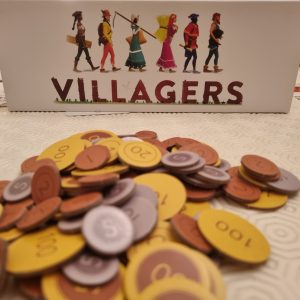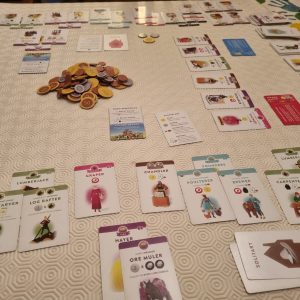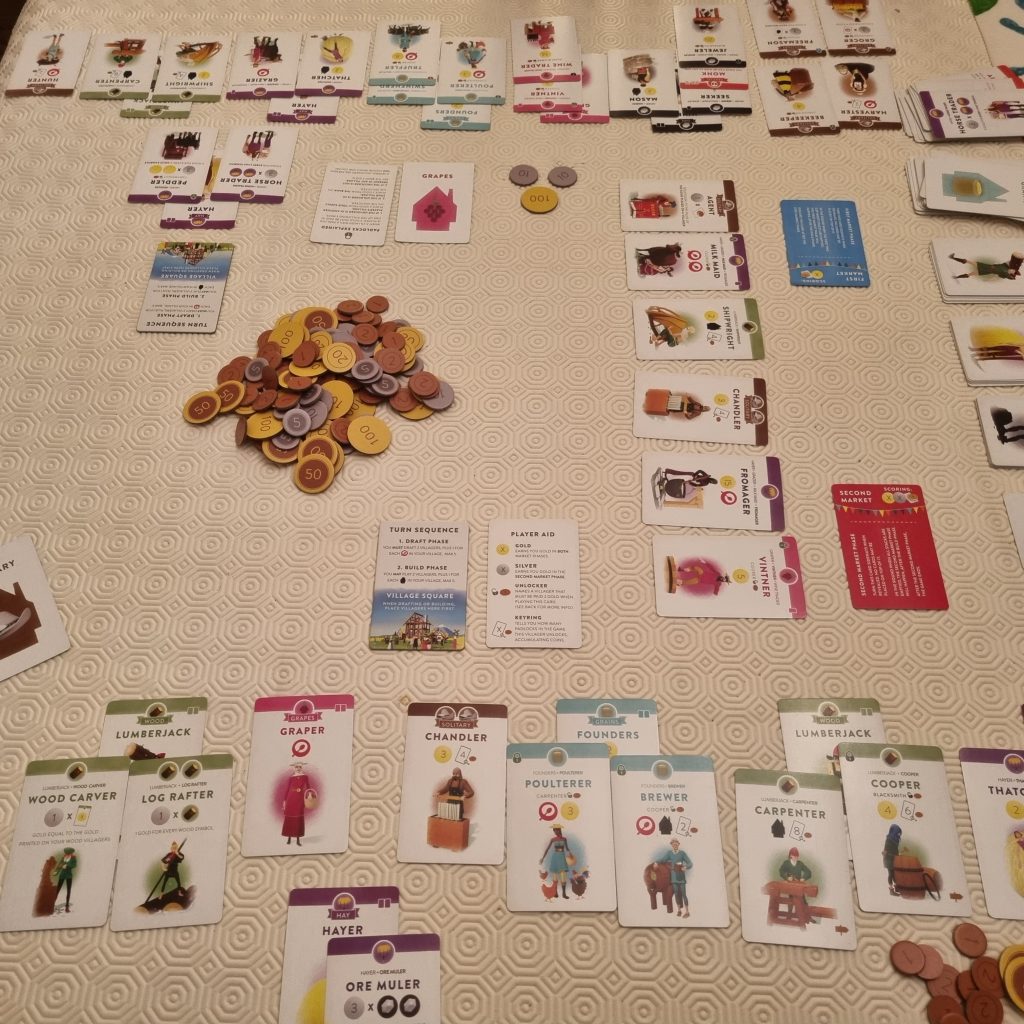Who will build the best Village of them all? In Villagers; the set collecting, tableau building game from Sinister Fish Games, it’s time to pick the cream of the country crop!
Publisher: Sinister Fish Games
Designer: Haakon Gaarder
Artist: Haakon Gaarder
Release date: 2019
1-5 Players
Age: 10+
30 – 40 mins
Favouritefoe score: 8/10
*Set Collecting *Hand Management * Tableau Building * Solo Play * Card Drafting *
Wowza, the Plague sucked. But, on the bright side, thanks to Villagers, we now get to build new villages from scratch! See? Things are looking up already! Before you get too giddy with golden hellos, however, your new people have needs. Basic, but they’re there. Question is therefore; can you please your peeps and build the mega medieval metropolis you always wanted?
Rural Rules!
Before I go on, I need to make one thing clear; please don’t judge this game, the designer, or the publisher by the rule book. I know it’s hard; confusing descriptions can make it tricksy to enjoy a new game. And rules can be really tough to explain – I have helped in this process a few times, and it difficult to describe a turn or gameplay in universally understandable terms.
But trust me. Villagers is a smooth and straightforward experience if, during the first few plays at least, you rely on your instincts more than the instructions.
Simple Set Up!
To be fair, they’ve kind of made up for that little rule wrinkle by enclosing everything in an absolutely brilliant box! Small, compact, with excellent dividers to separate out all the different card types. Thanks to the design, once you’ve played your first game, Villagers will get from box to table in seconds!
But, in case you’re still head scratching over a few rules, here’s just a quick overview of the set up and game play to help with your first game;
- Each player takes a founder card, a village square card, 8 gold coins, and a hand of 5 villager cards;
- Shuffle all the remaining villager cards, and place 6 stacks face down (each containing the number of cards x twice the player count). Flip over the first card from each one and place below the respective stacks – this is the “Road”;
- Place the first and second market cards at the bottom of the 2nd and 6th stacks respectively;
- Make a reserve pile of remaining villager cards; and
- Keep the pile of coins close by.
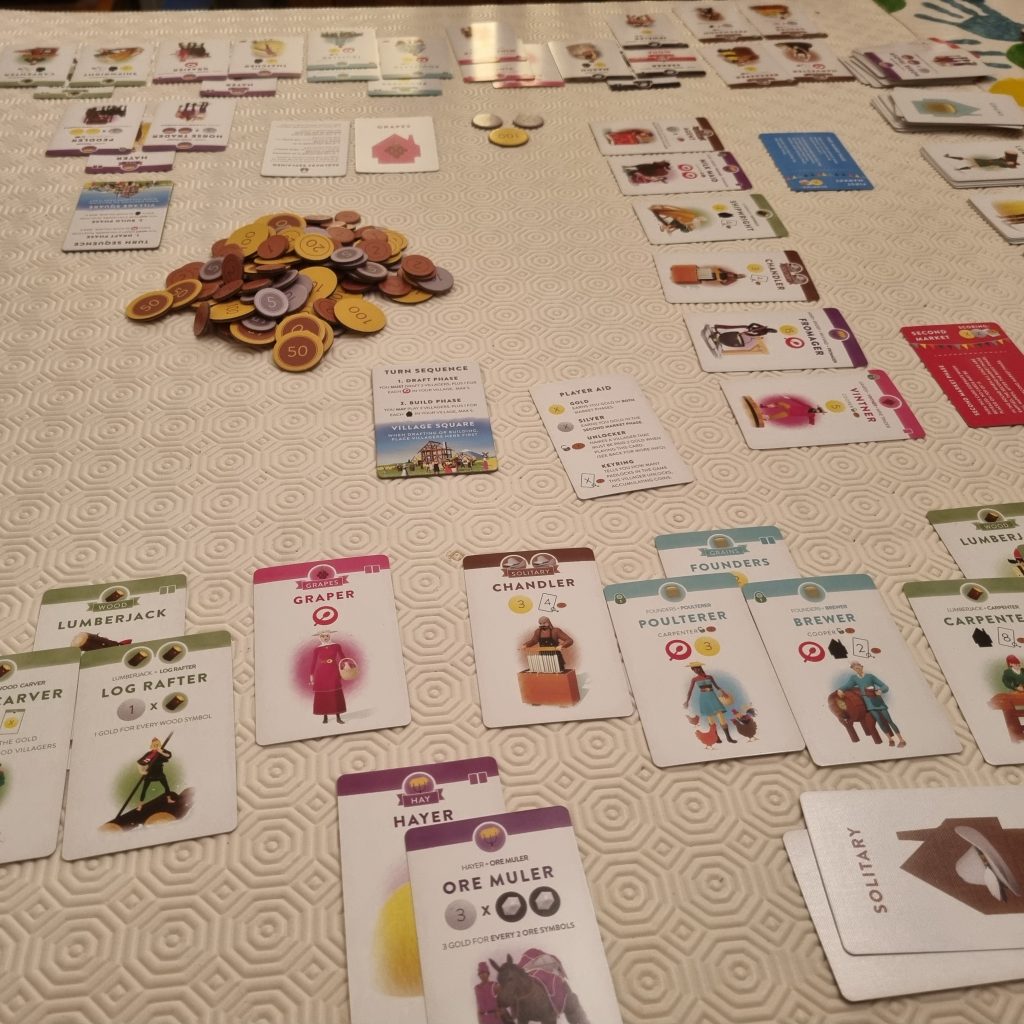
Drafting, Dude!
Villagers is played over two phases; (1) Draft and (2) Build
In the Draft Phase, you take turns to pick villager cards from the road. You can only take as many cards as you have cards on your Village Square card that show the red food symbol. In the first round, this will only be one, as the only symbol you’ll have will be the one printed on the Founder card itself. In later rounds, however, you may be able to pick 4,5,6……. as many as you can feed, basically!
Whenever a villager card is taken, it goes onto your Village Square card and the Road is restocked from the reserve deck. Any villagers left get a coin placed on them, and the empty spaces are restocked from the reserve deck, ready for round 2.
Building Up!
Once you have each taken turns to pick the cards you are allowed, they then go from your Village Square into your hand, and the Build Phase begins.
Here, you take turns to placing villagers into your own village. But the number of villagers you can settle down will depend on the number of building symbols you have on the cards already in your village. You can always place two, but any building symbols you have on villagers already placed will add an extra opportunity to settle another one in this phase.
I should say that villagers are specialists, and by that I mean they fall into three main industry groups; farming, lumber, and mining. And this is easy to spot through the symbols and colours used on the cards.
Some villagers can be placed in your village straight away – “solitaire” cards. Others, however, form part of production chains. They need more basic villagers in place before they can come and expand your new middle ages metropolis. And to help with this, each villager card also shows the number of cards they can carry in terms of building up chains. Look at the basic lumberjacks, hayers, and miners and you’ll see that each one can each form the basis of two separate chains.
You’ll also notice that some cards show small padlock symbols – if you want to place one of these villagers, you’ll need to unlock it first. And this is done by already having the necessary villagers in either your own village, the Road, or in an opponent’s. If it’s in your village, you get to take 2 coins from the bank and place them on the unlocker card. If it is a temporary resident on the Road, you have to pay the bank from your stash. But ,if the unlocker is in an opponent’s village, you have to pay them! And you can’t choose bank over opponent (believe me, I tried!).
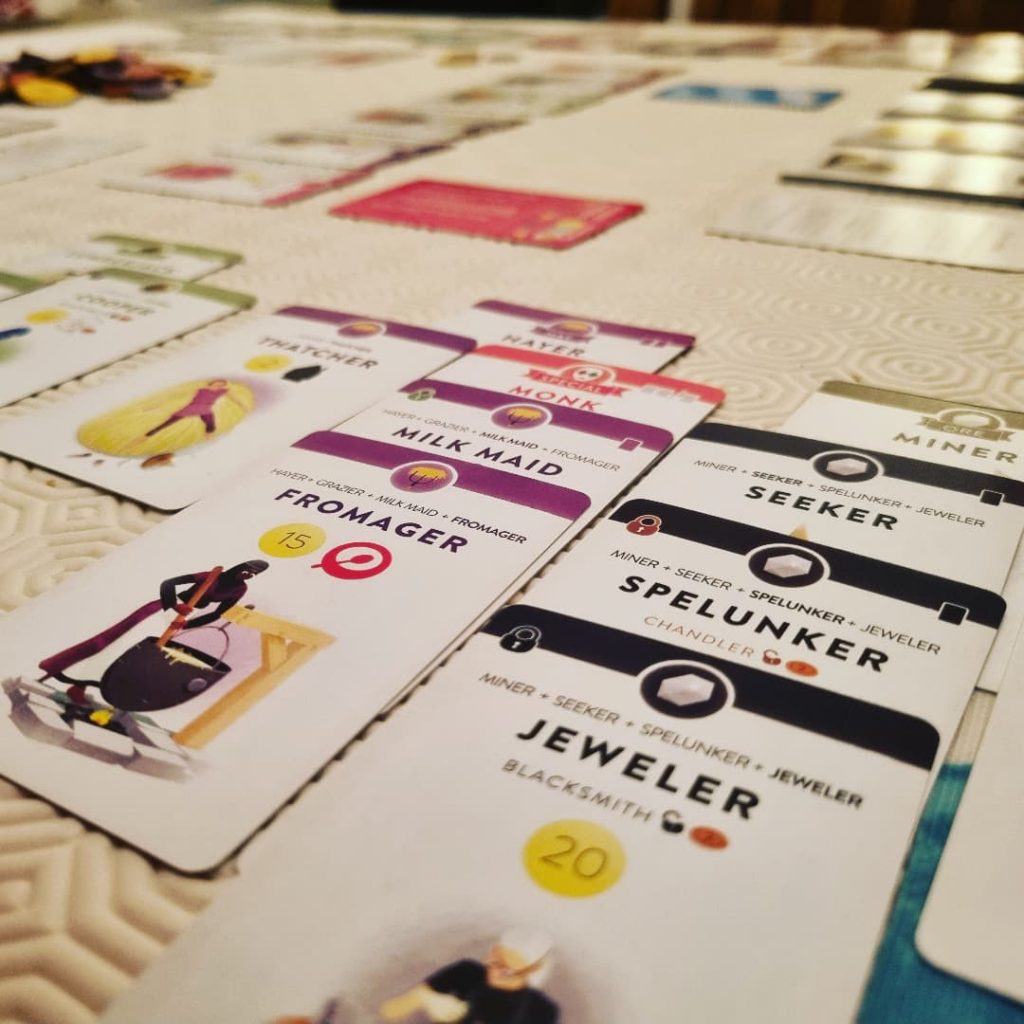
Special Settlers!
There is one final type of villager, and these are the special ones. They have powers that can range widely from increasing your earning potential to swapping cards to tempting villagers away from an opponent’s– basically boosters or busters! I personally like the Monk –their stand-in power makes for some handy production chain possibilities. Oh and the Scoundrels that come in the KS expansion– they can raze an opponent’s (husband) village to the ground! Haha
Money Markets!
At the end of the second and sixth rounds, a market card will be revealed – this is when the hassle of being a real-estate wrangler pays off! And, after all, this game is all about making the most profitable village of them all. People = pounds in this game!
First time you go to market, you’ll get coins for every villager in your village who shows gold coins – tot them up and pay yourself a nice profit from the bank. At the end of the sixth round (aka the end of the game), the golds pay out again. But this time, so do any silver symbols on show. And the word “show” is critical when turning folk into rolling returns. Let me tell you why……
Throughout the game, you’ll have been building up little sets; laying cards over other cards that (hopefully!) are worth more in terms of bonuses and money. The end of a long chain of cards is always going to be a case of mo’ money, mo’ money. But they often come with conditions or objectives that you cannot ignore. No use having a Villager that pays out for each food symbol at game end if you’ve gone and covered them all up in the 5th round! You only get what you can see when its time to go to market.
And that is the silky, strategic, set collecting sauce in Villagers; it is a game of forward, side, and backwards thinking in a small, compact little box!
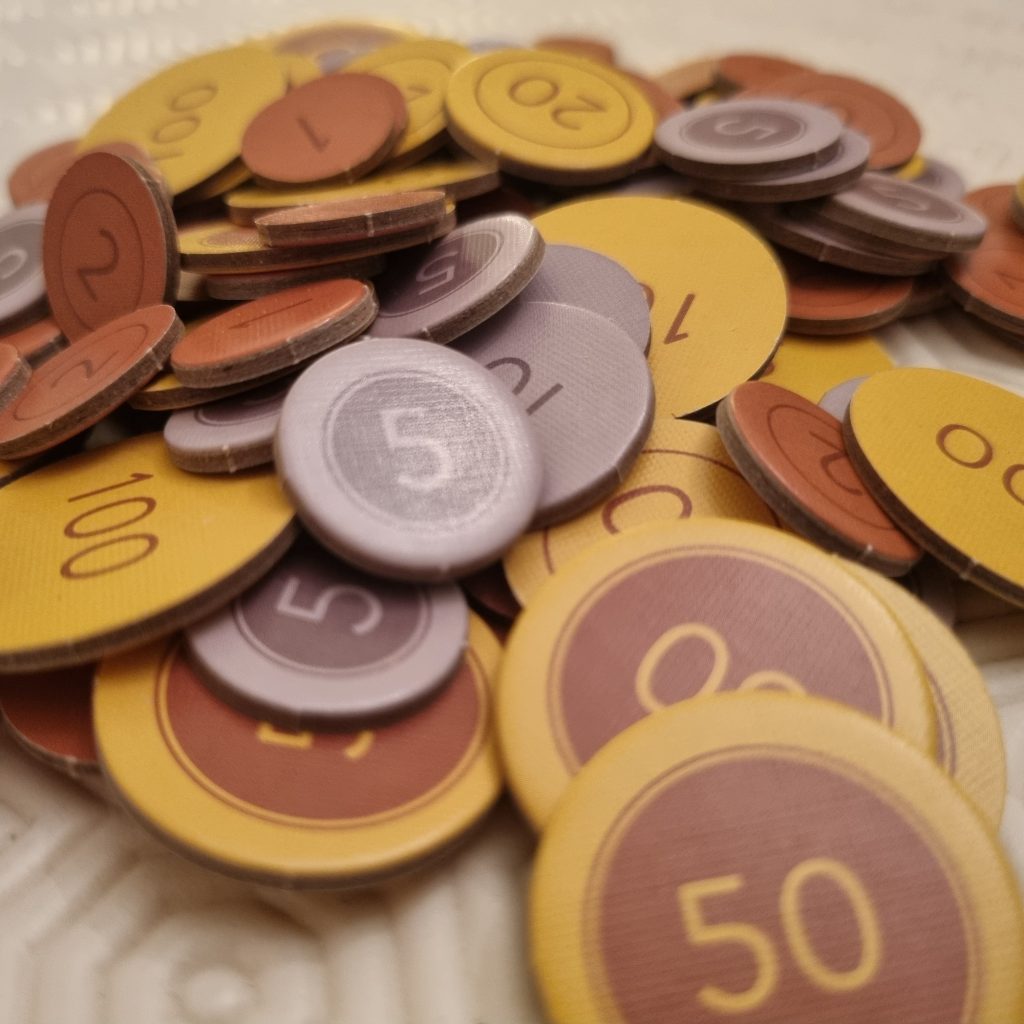
Quality Components
I have been lucky enough to play the Kickstarter exclusive pack and Sinister Fish know how to package a game. The card art is subtle but lovely, and the box inserts and design have already been praised to the max. Yes the expansion has additional printed wooden meeples and a wonderful cockerel first player token, but the look and feel of the cards (of which the KS expansion has extras!) is where this game shines for me. The coins could have been a little fancier – small card circles aren’t terribly exciting to hold – but overall I think they have done a very good job. And for the price, you get a lot of gameplay (and I don’t just mean the amount of table space it takes up!).
Hard Choices and Haters
This game is about trade-offs and pay-offs, and timing things just right. Picking villagers who show food symbols early on to give you the pick of the people. But never forgetting your need to build their businesses. After all, you want them to pay you generously as the game goes on!
Not only that, but choosing folk who will form the basis of long chains that give combo scoring opportunities at end game. And that can mean short term losses in early turns. Sacrifices that hurt your purchasing power when padlocks and profits come into sharp focus.
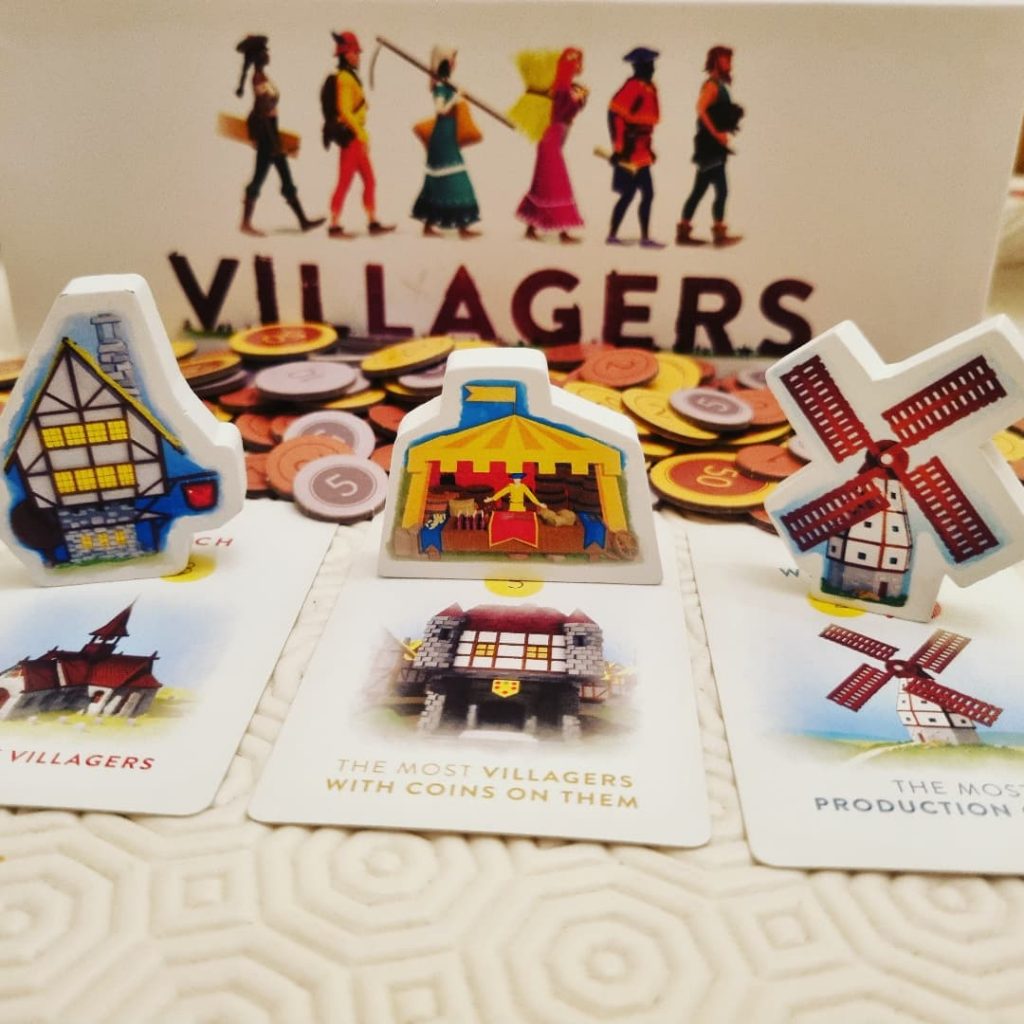
Plus, and this is a BIG plus point in our house, Villagers tempts you into hate-drafting like a hustler. See a card you know another founder is likely to need? Even if you can’t place it and don’t want it, you’ll be tempted to grab it. Same with unlockers; who wants to pay an opponent when you could be paying yourself? Or failing that, the bank who won’t steal victory from you!
And that can mean even more sacrifices. Take the card you want, or the card you don’t want them to have? Who said development was going to be easy?!
This direct interaction is improved thanks to the introduction of Scoundrels in the KS expansion pack – using those against each other results in some very prickly playing indeed (and we like it!) – the Thief and the Schemer’s stealing powers are niiiiiice in the nastiest way!
I appreciate that hatey-play might not appeal to some players; the ability to be really mean in a game is a Marmite factor. And some cards are mega powerful when they are working either for or against you. This lack of balance can lead to players ploughing up the profits whilst you watch your bank balance dwindle fast. But there are a lot of cards to cycle through though (particularly in the expanded Kickstarter edition), so picking something to counter the cruelty is often possible.
I also mentioned earlier that I have favourite villagers to play. In isolation, this could risk games that feel quite samey with regular opponents. But randomly drawing the stacks, and drilling down into different strategic approaches is definitely keeping play fresh for us. Plus the expanded content in the KS expansion which you can mix and match means even more options and opportunities to mix things up.
Ultimately, for me, Villagers is a fast playing, brain burny, set collecting, card drafter. Simple and intuitive, the gameplay (rule book notwithstanding) ticks my tactical boxes when I want something smooth and strategic in around 30 mins.
I really like the additional play the expansion brings too – having specific powers (good and bad) at the start of the game, as well as mixing in new cards, plus additional objective of controlling new buildings that pay out profits means a lot more choice, a lot more opportunity, and a lot more strategic play.
[Please note that a copy of this game was kindly provided by the publishers for review. I am not paid for my comments, however, and all opinions are my own].

